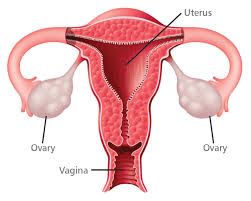ovary
英 ['əʊv(ə)rɪ]
美 ['ovəri]
ovary 卵巢来自拉丁语ovum,卵,蛋,来自PIE*oyyo,卵,蛋,词源同egg.用于指卵巢。
- ovary
- ovary: [17] Latin ōvum ‘egg’ came from the same Indo-European base (*ōwo-) as produced English egg. From it were derived the medieval Latin adjective ōvāl is ‘egg-shaped’ (source of English oval [16]) and the modern Latin noun ōvārium (whence English ovary). Also from ōvum come English ovate [18] and ovulate [19], and the Latin noun itself was adopted as a technical term in biology in the early 18th century.
=> egg - ovary (n.)
- 1650s, from Modern Latin ovarium "ovary" (16c.), from Medieval Latin ovaria "the ovary of a bird" (13c.), from Latin ovum "egg," from PIE *owyo-/*oyyo- "egg" (see egg (n.)). In classical Latin, ovarius meant "egg-keeper."
- 1. Only the styles are left sticking up from the receptacle and ovary.
- 在花托和子房上面只剩下花柱.
来自辞典例句
- 2. The fertilized ovule becomes the seed, and the ovary becomes the fruit.
- 已受精的卵子成为种子, 而子房变成了果实.
来自互联网
- 3. Polycystic ovary syndrome ( PCOS ) is the most common cause of chronic anovulation.
- PCOS是持续无排卵的最常见原因.
来自互联网
- 4. This is an adult ovary with two corpora lutea.
- 图示成年人卵巢,可见两个黄体.
来自互联网
- 5. To treat delayed ovulation, Inactive ovary, durable luteinizing, ovarian cyst.
- 用于治疗动物延迟排卵 、 卵巢静止 、 持久黄体 、 卵巢囊肿等.
来自互联网
[ ovary 造句 ]
